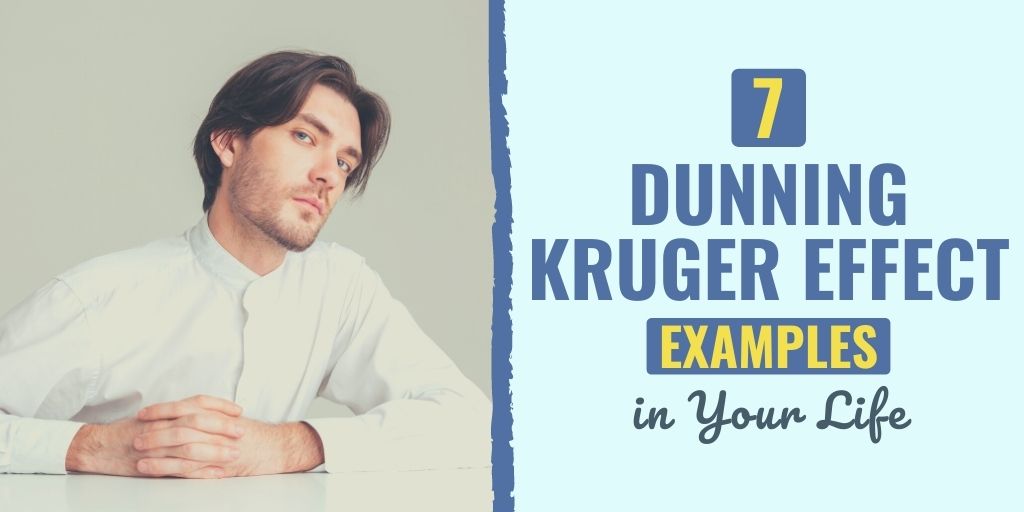“It ain’t what you don’t know that gets you into trouble. It’s what you know for sure that just ain’t so.” – Josh Billings
Have you ever been tasked with making a decision that would have enough of an impact on others that you pause to wonder if you really have the knowledge and skills to be making that decision? While others are trusting you with that power, you’re second-guessing your own competence.
You may recognize this type of scenario from when we talked about imposter syndrome a while back–and if you can relate to it, you’re among an estimated 70% of the population who has felt this sense of self-doubt at some point.
Now think about what the opposite of that scenario would feel like–you believe you’re one of the top players in your group, but you’re not asked for your opinion regarding a consequential issue. An instance like this might suggest your understanding of your own expertise may be flawed.
This is what the Dunning Kruger effect refers to. And in this article, we are going to look deeper into this psychological phenomenon and then review seven examples of it that you may come across in your own life.
Let’s get started.
What is the Dunning Kruger Effect?
This cognitive bias is based on the idea that when people know very little about a particular subject, they tend to overestimate their knowledge, skills, and abilities. Alternatively, those who are experts underestimate their knowledge because they know there is so much more to learn and they assume others already know what they do.
Thinking back to when we talked about the stages of learning, you may recall stage one as being a time when you don’t know the deficit in your knowledge. You’re unaware of your incompetence and the wealth of knowledge that you have yet to uncover. This is where people who are impacted by the Dunning Kruger effect are.
On the other hand, experts in any field know of continuous research and the gaps in knowledge that have yet to be uncovered. Because of this, they feel their scope of comprehension is limited because of the vast amount of information that is yet to come.
In 1999, Justin Kruger and David Dunning published a study of four investigations that demonstrated how incompetent people are often unable to recognize their own lack of expertise. And this makes sense–as it would require poor performers to have sufficient intellectual humility in order to recognize their own ineptness.
In other words, to have the insight to recognize one’s own novice status requires knowing what you don’t know, which is impossible for those who are incompetent. Often, people are unable to perceive the scope of their ignorance; but the truth is, we are all unskilled at one thing or another–the question is, do you recognize your incompetence?
Doing so can be challenging, as people are really only able to self-evaluate from their own point of view, which is both limited and subjective. And from their own perspective, they naturally feel like they know what they’re talking about, they’re skilled, and other people are wrong, which tends to skew people’s views on their abilities.
In their research, Kruger and Dunning found that on average, test-takers who earned the bottom 12% of scores in grammar, humor, and logic tests had estimated their performance to be in the 62nd percentile. This fact defined the psychological phenomenon of the Dunning Kruger effect.
In the following examples, you will see that people often judge their abilities as being better than others to a degree that is mathematically impossible. Let’s take a look.
7 Dunning Kruger Effect Examples in Your Life
1. In a Professional Environment
You may notice the Dunning Kruger effect present in your working environment. Perhaps you have a conceited (but clueless) boss, or that “one coworker” who thinks he or she is the star player on your team. These people are challenging to work with because they’re not very open to others’ ideas.
If you have a boss who has fallen victim to the Dunning Kruger effect, it can be difficult because they’re unable to judge other people’s performance accurately or fairly and you have to rely on their good judgement for your career advancement.
The Dunning Kruger effect happens in a range of professions and has been the subject of a variety of studies. Although mathematically impossible, one poll of University of Nebraska faculty found that 68% of professors believed themselves to be among the top 25% in terms of their ability to teach, and 90% reported themselves to be above average.
In another study, 42% of software engineers rated their professional abilities as being among the top 5% of their peers. While it’s good to have confidence in your professional abilities, you don’t want this sense of pride to prevent you from seeking out new learning opportunities.
2. Personal Characteristics
The Dunning Kruger effect doesn’t only apply to factual knowledge, it is also relevant to what people think about themselves.
People think highly of themselves–which isn’t necessarily a bad thing, but mathematically and realistically, not everyone can be above average. In a 1976 study that polled over one million students, 70% reported they were in the top 50% in terms of leadership ability and 60% thought they were superior in athletic ability.
What’s more, 85% rated themselves as being among the best at getting along with others–with a shocking 25% claiming they were in the top percentile when it comes to this friendly characteristic.
3. Rate Your Knowledge
Think of a high school student who perhaps took a class in psychology. An entry-level course on this subject can cover a wide range of topics at surface level. But after finishing the course, one may feel like they have a good grasp on psychology because they got an A on the final exam and they’re comfortable talking about psychology in class with other students. They figure they know all there is to know.
Then introduce this student to someone who is graduating with a master’s degree in psychology. This graduate probably feels like they have so much left to learn because they don’t have their doctorate degree or much experience working in the field. The high school student may wonder how one class had been turned into an entire degree, but after being clued in on the scope of knowledge that there is to have in psychology, it’s clear that the high school student didn’t know what she didn’t know.
Like others impacted by this phenomenon, the high school student was full of enthusiasm and confident in her knowledge, but really clueless on just how much she didn’t know yet. But once someone starts to gain in-depth knowledge on the subject, they recognize how large the field actually is. And, the more someone learns, the more humbled they become about how much there is that they don’t know.
This example is a good one that shows the Dunning Kruger effect doesn’t have to do with one’s ego, as people are readily willing to recognize and admit to their initial incompetence once their knowledge starts to broaden.
4. Singing Talent Shows
I’m sure you’ve spent some time watching the auditions on some popular competition shows such as American Idol and America’s Got Talent. Many people watch these tryouts to see the contestants who wrongfully believe they’re extremely talented.

One infamous example of this is the audition by William Hung for American Idol. Because it’s hard for people to judge themselves accurately, these people are often genuinely disappointed when they don’t make it to the next round.
5. Politics
A 2018 study found that Americans who don’t know very much about politics are more likely than others to overestimate the depth of their knowledge on the political system and current events.
Furthermore, those with relatively low political expertise report themselves as being increasingly knowledgeable about politics when partisan identities are being focused on. One study showed that people with a below‐average knowledge of politics often rely on cues from partisan sources to gain political opinions, which can lead to rational ignorance and further political polarization.
According to the Dunning Kruger effect, when we come to a conclusion, it (of course) seems to be the correct one. In fact, much of what we choose to believe about our individual environments and the world is pieced together by our brains. Keeping this in mind, it may lead you to take pause when it comes to political opinions and consider another’s point of view. Doing so could lead you to accept that your original conclusion may be wrong.
6. Jimmy Kimmel Interviews
One thing about the Dunning Kruger effect is that it illustrates that a lack of knowledge doesn’t always leave people uncertain about a subject. In fact, incompetent people often have a disproportionate level of confidence about their understanding, and feel encouraged by what they perceive as being knowledge.
In this video, which is part of Jimmy Kimmel’s “Lie Witness News” segment, Kimmel hits the streets of South by Southwest, an annual music and media festival held in Austin, TX. Kimmel filmed concertgoers, asking them questions about bands that were “new to the scene”–but what the people didn’t take note of was the clearly fake band names being brought to their attention, such as Contact Dermatitis and Tonya and the Hardings.
Kimmel told viewers that people who attend music festivals often take pride in their vast knowledge of up and coming bands. As you can see in the video, people will speak to acts even if they don’t know who they are, some even creating entire stories about these made-up bands and detailing them with confidence.
7. Finances
Research suggests that while Americans are often confident about their financial matters, they are largely ignorant on the matter. In 2012, the U.S. Treasury conducted a National Financial Capability Study, where they asked about 25,000 participants to rate their financial literacy before going on to measure how much the respondents actually knew about finance.

As expected, the 800 respondents who had declared bankruptcy in the last two years did the worst on the financial test; however, 23% of the recently bankrupt crowd rated themselves with the highest possible scores for financial literacy. Furthermore, 67% of these respondents were eager to endorse their false knowledge, believing it to be fact.
Final Thoughts on the Dunning Kruger Effect
Because we’re quick to judge the cognitive deficits of others, it may be tempting to think the Dunning Kruger effect doesn’t apply to you. However, we all display ignorance that we don’t immediately recognize at one point or another. This doesn’t make us uninformed, though–rather, misinformed. The problem comes when we see this in others but refuse to see it in ourselves.
To avoid falling victim to this cognitive bias, make sure to ask for feedback on your work and remain a continuous learner throughout your life. Doing so will show you that you always have a lot left to learn, and it will keep you appropriately modest.
Learn About Other Logical Fallacies
- 5 Appeal to Nature Fallacy Examples in Media and Life
- 6 Outcome Bias Examples That Can Negatively Impact Your Decisions
- 7 Self-Serving Bias Examples You See Throughout Life
- 7 Omission Bias Examples That Negatively Impact Your Life
- 6 Authority Bias Examples That Might Impact Your Decisions
- 5 Burden of Proof Fallacy Examples
- 5 Appeal to Tradition Fallacy Examples in Life
- 5 Appeal to Authority Logical Fallacy Examples
- 7 False Cause Fallacy Examples
- 7 Appeal to Ignorance Fallacy Examples
- 7 Appeal to Common Sense Logical Fallacy Examples
- 5 Post Hoc Fallacy Examples (and How to Respond to This Argument)
- Gambler’s Fallacy: 5 Examples and How to Avoid It
- 5 Appeal to Anger Fallacy Examples Throughout Life
- 7 Halo Effect Bias Examples in Your Daily Life
- 7 Poisoning the Well Examples Throughout Your Life
- 7 Survivorship Bias Examples You See in the Real World
- 7 Either Or (“False Dilemma”) Fallacy Examples in Real Life
- 5 Cui Bono Fallacy Examples to Find Out “Who Will Benefit”
- 6 Anchoring Bias Examples That Impact Your Decisions
- 7 Virtue Signaling Examples in Everyday Life
- 7 Cherry Picking Fallacy Examples for When People Ignore Evidence
- 9 Circular Reasoning Examples (or “Begging the Question”) in Everyday Life
- 9 Appeal to Emotion Logical Fallacy Examples
- 9 Appeal to Pity Fallacy (“Ad Misericordiam”) Examples in Everyday Life
- 9 Loaded Question Fallacy Examples in Life and Media
- 9 Confirmation Bias Fallacy Examples In Everyday Life
- 9 Bandwagon Fallacy Examples to Prevent Poor Decisions
- 5 Red Herring Fallacy Examples to Fight Irrelevant Information
- 9 Middle Ground Fallacy Examples to Spot During an Argument
- 5 False Equivalence Examples to Know Before Your Next Argument
- 7 Hasty Generalization Fallacy Examples & How to Respond to Them
- 6 Straw Man Fallacy Examples & How You Can Respond
- 6 False Dichotomy Examples & How to Counter Them
- 7 Slippery Slope Fallacy Examples (And How to Counter Them)
- What is the Planning Fallacy?
- How to Overcome the “Sunk Cost Fallacy” Mindset
Finally, if you want a simple process to counter the logical fallacies and cognitive biases you encounter in life, then follow this 7-step process to develop the critical thinking skills habit.

Connie Mathers is a professional editor and freelance writer. She holds a Bachelor's Degree in Marketing and a Master’s Degree in Social Work. When she is not writing, Connie is either spending time with her daughter and two dogs, running, or working at her full-time job as a social worker in Richmond, VA.


